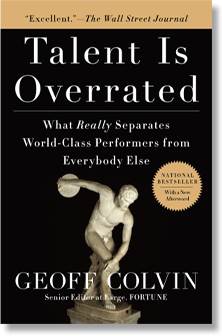Early in the reading of this book I enjoyed exploring the myth of talent and deepening my understanding of deliberate practice. My personal reflection fell into two themes, and what stood our for me was;
- As a parent, how I can encourage my children to strengthen their abilities for what they love. And how they can approach practice in an efficient and valuable way to increase their abilities.
- As a professional, how it is important to trust the expertise people have developed over the years and allow their multiple intelligences to emerge in the workplace by not getting in their way. I often find senior personnel getting in the way of peoples intelligences. A person who has over 10,000 hours of practice is going to intuitively know things that other are not. We need to trust this for ourselves and for others.
As I moved into the later chapters I began to understand how this book becomes a management consulting book focused on good leadership. The book deep dives into the value of deliberate practice in management training for organizations who want to remain leaders in their field. We have entered into a knowledge based economy where command and control based organizations will not survive; there is too much to know and no one individual can keep up. Staying competitive is a shared responsibility among all the employees and building great leaders and exemplary knowledge workers is key to this. As I read this section of the book it became painfully apparent that working for an organization that does not encourage leadership training and deliberate practice among its employees is a poor career decision for those who stay with such an organization. In the end each individual is responsible for their own skills and knowledge, having a deliberate practice around continued professional development is paramount for ongoing career success, working for organizations that overtly support this is important.
As the booked moved into its closing chapters it looked at how deliberate practice is also great for teams; in particular, how teams of individuals are different than teams of collectives. A group of individual top performers is often outperformed by a collective of people where the deliberate practice includes many team focused activities. As a technologist I was very attracted to the chapter describing deliberate practice and innovation. The book looked deeply into the eureka moment and how it rarely exists, most great innovation comes from years of hard work within a given subject area. Ideas are built upon one another and discoveries are often slowly baked to completion.
I believe this book will affect me for many years to come. It will impact the way I parent and how I encourage my children to pursue the things that interest them. It will change the way I practice and learn about the things I am interested, and having read the book I will never be able say I don't have the talent. When it comes to the workplace, and working in small teams, I will draw on this book as a reference in building a strong and healthy workplace with teams who have broad and focused abilities, and how those attributes can be encouraged. If you want a book to draw upon when taking on tasks that seem out of reach, this would be an excellent book to start.
As the booked moved into its closing chapters it looked at how deliberate practice is also great for teams; in particular, how teams of individuals are different than teams of collectives. A group of individual top performers is often outperformed by a collective of people where the deliberate practice includes many team focused activities. As a technologist I was very attracted to the chapter describing deliberate practice and innovation. The book looked deeply into the eureka moment and how it rarely exists, most great innovation comes from years of hard work within a given subject area. Ideas are built upon one another and discoveries are often slowly baked to completion.
I believe this book will affect me for many years to come. It will impact the way I parent and how I encourage my children to pursue the things that interest them. It will change the way I practice and learn about the things I am interested, and having read the book I will never be able say I don't have the talent. When it comes to the workplace, and working in small teams, I will draw on this book as a reference in building a strong and healthy workplace with teams who have broad and focused abilities, and how those attributes can be encouraged. If you want a book to draw upon when taking on tasks that seem out of reach, this would be an excellent book to start.
